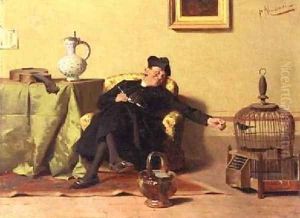Pompeo Masani Paintings
Pompeo Massani was an Italian painter known for his genre scenes, portraits, and historical paintings. Born in 1850 in Florence, Italy, he lived during a period that was rich in cultural and artistic development. The 19th century in Italy was a time of significant transformation, with the unification of the country and a resurgence in the arts and literature, a period known as the Risorgimento.
Massani studied at the Academy of Fine Arts in Florence, where he was influenced by the Macchiaioli, a group of Italian artists who were forerunners of the Impressionist movement. Although not directly associated with the group, the Macchiaioli's emphasis on light and color can be seen in Massani's works. He was particularly adept at capturing the nuances of everyday life in his genre scenes, creating works that were both evocative and accessible to a wide audience.
Throughout his career, Massani exhibited his works in various Italian cities as well as abroad. His paintings often depicted scenes of bourgeois life, children, and elegantly dressed figures, showcasing his skill in rendering textures, from the softness of skin to the richness of fabrics. Massani's portraits were also well-regarded, as he was able to convey the character and social status of his sitters with finesse.
Massani's historical paintings reflect the 19th-century Italian interest in the past, particularly the Renaissance, and often contained allegorical or patriotic themes that resonated with the spirit of the Risorgimento. He was adept at large-scale compositions, demonstrating a strong command of both form and narrative.
Pompeo Massani continued to paint until his death in 1920. His works remain a testament to the skill and versatility of late 19th-century Italian painting, capturing the essence of an era that straddled tradition and modernity. Today, his paintings can be found in various art collections and museums, offering a window into the world of post-unification Italy.
